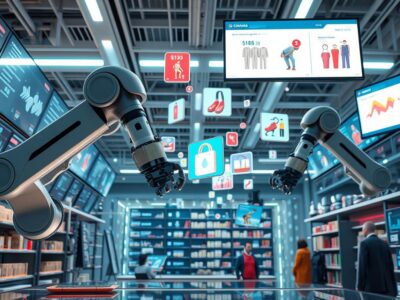AI-powered marketing automation is changing digital marketing. It is crucial for businesses that want to keep up with customer demands. This technology includes real-time engagement and streamlined workflows. It also provides insights to increase conversion rates and build customer loyalty.
Next-gen marketing automation platforms come with advanced AI. They use deep learning and natural language processing. This can precisely analyze customer behavior and predict trends. It helps in tasks like lead scoring and creating dynamic content. It also improves SEO and pricing strategies.
By 2024, 25% of businesses are expected to use AI in marketing. This gives them a big advantage. It allows for personalization at scale. Predictive analytics and intelligent CRM integrations make marketing automation more powerful than ever.
Key Takeaways
- AI-powered marketing automation offers enhanced personalization and efficiency in digital marketing strategies.
- Adopting an AI platform is crucial for businesses to remain competitive in a landscape where customers expect personalized experiences.
- Marketers are witnessing a shift from production to strategic activities, powered by AI’s ability to optimize real-time campaign data.
- AI is revolutionizing the marketing scene by providing superior tools and technologies for predictive analytics and trend forecasting.
- Enhanced content creation, optimized ad targeting, and improved email marketing campaigns are direct benefits attributed to marketing AI.
- AI-driven analytics and personalization allow for a more profound understanding of customer behavior and interests, aligning marketing efforts with consumer demand.
Understanding AI-Powered Marketing Automation
Today’s marketing world is rapidly changing thanks to AI-powered marketing automation. This tech uses artificial intelligence to make marketing smarter, faster, and more focused on individual needs. It’s transforming how businesses reach out to customers.
What is AI-Powered Marketing Automation?
AI-powered marketing automation means using AI to do jobs we used to do by hand. With machine learning, companies can look through huge amounts of data quickly. They see patterns and make smart choices faster. This leads to better targeting and personalization in marketing.
Key Features of AI Marketing Tools
One great thing about AI marketing tools is how they learn and get better over time. They use smart algorithms to make emailing and chatting with customers more effective. By predicting what customers will do next, they allow for very personalized messages. This makes for happier customers and more sales.

Take HubSpot and Marketo, for example. They use AI to make offers more personal, just like JPMorgan Chase does. Amazon uses AI to suggest products that fit just right, boosting their sales. This tech works wonders in healthcare and education too, like with the AI chatbots at Cleveland Clinic and Georgia State University.
Looking at the numbers shows how powerful AI can be. For Salesforce, AI not only made customer talks more personal but also cut costs. Almost two-thirds of marketers think AI is essential in their work. Clearly, it’s making a big difference.
So, what’s the takeaway? Using AI in marketing helps companies be more efficient and sharp. It offers deeper insights into what customers want. As more businesses use AI, they’re finding new ways to grow and stay ahead. The future of marketing looks bright with AI leading the way.
Benefits of Implementing AI in Marketing
Adding Artificial Intelligence (AI) into marketing plans greatly helps businesses. It makes things more efficient and improves how we understand our customers. With AI, businesses can also offer more personalized experiences. These are not just ideas; real results back them up.
Enhanced Customer Insights
AI-driven tools, especially smart CRM systems, use data analytics and Natural Language Processing (NLP). This lets businesses dig into customer data better. As a result, they understand customer feelings better. This can influence everything from making new products to how we serve customers.
By looking at patterns and feelings in customer talks, businesses can create sharper marketing strategies. This makes their marketing efforts more focused and successful.
Increased Efficiency and Productivity
Automated marketing tools save a lot of time on everyday tasks. These include entering data, analyzing campaigns, and splitting up customers into groups. AI helps pick the best times to talk to customers and suggests campaign tweaks. This quickens the marketing work. It also lets teams use their time on creative and strategy tasks that need human thinking.
Personalization at Scale
With AI-driven email marketing, companies can send custom messages to a lot of customers at once. AI lets them split email lists and change messages for each person based on what they like and do. This boosts engagement rates and builds customer loyalty.

| Feature | Impact on Marketing |
|---|---|
| Customer Data Analysis | Enables discovery of new customer segments and personalized content recommendations. |
| Campaign Orchestration | Automatically determines the most impactful campaign for individual customers. |
| Efficiency in Task Automation | Optimizes repetitive tasks like email scheduling and real-time campaign adjustments. |
| Personalized Customer Engagement | Improves customer interaction through personalized chatbot communications and dynamic web content. |
AI in marketing not only makes operations smoother but also brings a new level of personalization and understanding of customers. As AI technology gets better, we will see even more benefits. There will be greater efficiencies and better ways to interact with customers.
Choosing the Right AI Marketing Automation Software
Finding the best AI digital marketing platform is key. It must work well with systems you already use, like smart CRM. Different software has special features for parts of digital marketing, such as automated emails powered by AI. Picking the correct tool is vital for getting the marketing results you want.
Key Factors to Consider
It’s important to match the AI tool with your marketing goals. The tool should add to your current marketing tools and grow with your business. It should work with other tech systems, be easy to use, and have strong support. A good AI marketing platform also handles a lot of data. This lets you analyze and improve your strategies continuously.
Top AI Marketing Tools in 2023
In 2023, leading tools include HubSpot, famous for its CRM and email automation, and Mailchimp, known for its powerful analytics and list sorting. Adobe Campaign is also a top choice. It offers excellent real-time personalization across different channels.
These tools boost lead scoring and social media management. They show how using advanced AI can change everyday marketing tasks for the better.
| Platform | Core Features | Starting Price |
|---|---|---|
| HubSpot | Email automation, CRM, Lead scoring | Included in subscription |
| Mailchimp | Predictive analytics, List segmentation | Varies with plan |
| Adobe Campaign | Real-time personalization, Cross-channel marketing | Custom pricing |
Choosing the best AI marketing tool can really help you connect with customers. It can also grow your business a lot.
Best Practices for Leveraging AI in Marketing Automation
Getting into ai-powered marketing automation is a smart step towards more focused, customer-based marketing. It all depends on handling data smartly and always adjusting strategies to fit new market trends and what customers want.
Data Management and Integration
For automation technology in marketing, handling and combining data is key. Quality, connected data lets AI find useful insights and run focused campaigns. It’s important that tools for AI marketing, like Salesforce for custom emails or AI tips on content, get to use data from across platforms. When we link these tools with the company’s existing systems, every bit of customer detail is used, making marketing more personal and effective.
Success in integrating means not just bringing data together. It also means linking marketing plans across all platforms. This keeps messages the same everywhere and makes the most of AI’s ability to analyze, as noted by experts in AI solutions.
Continuous Learning and Optimization
The work of AI-driven email marketing doesn’t stop once it’s up and running. AI grows by testing, learning from data, and changing based on what it learns. Tools like Albert AI change strategies using up-to-the-minute data, always fine-tuning. This endless cycle of learning and improving lets marketers make their campaigns more fitting and interesting, keeping up with what consumers like.
AI also gets better through predictive analytics, guessing what customers will want or do next. Fine-tuning these guesses can hugely benefit digital marketing plans, maybe even boosting how many people engage with them or buy, as backed by AI-powered digital marketing advice.
In short, using the best practices for ai-powered marketing automation means setting up smart systems for data and being ready to change with customer and market shifts. It’s all about using AI to send marketing that is personal, timely, and works well.
Future Trends in AI-Powered Marketing Automation
In the fast-paced digital world, next-gen marketing automation tools are changing fast. They’re making a big impact on how brands connect with people. The way we market has changed for good thanks to automation, especially with predictive analytics in marketing. This trend uses past data to guess future customer actions. This lets companies shape their marketing to work better.
The Rise of Predictive Analytics
Predictive analytics in marketing is a big deal now. It uses AI to predict how customers will act. This leads to more people engaging. Like, personalized email campaigns have seen better opening and clicking rates, which means more sales. Machine learning can now handle huge amounts of data for smarter decisions. This helps businesses meet customer needs ahead of time. SurveySparrow shows more companies want to use this for better marketing automation.
Ethical Considerations and AI Transparency
Building trust is key in keeping customers, and it’s even more important with AI in marketing. Leaders in the market focus on making AI clear and fair. They want systems that work well but are also free from bias and easy to understand. The use of AI, like natural language processing (NLP) and deep learning, is being watched closely. This is to stop mistreatment and too much reliance on algorithms that could hurt companies.
Automation and Data Privacy Compliance
Keeping data private is a big challenge with AI-powered marketing automation. There’s a tough balance between using data for insights and following strict rules like the GDPR. AI systems have to be smart in dealing with these issues. Firms are putting money into AI that respects privacy laws while still being able to do routine tasks. This saves money and boosts productivity. With 59 percent of marketers thinking AI will change their field, everyone’s rushing to keep up with these new changes in AI automation.
FAQ
What is AI-Powered Marketing Automation?
AI-powered marketing automation uses artificial intelligence (AI) to improve and automate marketing tasks. It acts like human intelligence in analyzing data and predicting trends. With this, it helps in making real-time decisions to enhance marketing efforts and personalization. This new generation of marketing automation employs machine learning. Machine learning automates tasks like customer segmentation, campaign management, and content creation more accurately and efficiently.
What are the Key Features of AI Marketing Tools?
AI marketing tools have several key features. They can analyze large amounts of data for insights and forecast customer behavior. They also process natural language for content creation and customer service. Personalized marketing strategies are another benefit. AI-driven email marketing and real-time adaptation to customer interactions stand out.
How can businesses benefit from Enhanced Customer Insights provided by AI?
By using AI-driven marketing and intelligent CRM, businesses learn more about their customers. This knowledge leads to better targeting and personalization of marketing campaigns. As a result, content and offers become more engaging, customer satisfaction improves, and conversion rates might rise.
How does AI in Marketing Increase Efficiency and Productivity?
AI boosts marketing efficiency by automating repetitive tasks. This allows marketers to focus more on strategy and creativity. Since AI-powered tools manage email marketing, social media, and campaign analysis, companies see better outcomes. They achieve more in less time with fewer resources. This significantly improves efficiency and productivity.
What does Personalization at Scale mean in AI Marketing?
Personalization at scale is about offering tailored experiences to many customers at once. AI marketing tools make this possible. Unlike traditional methods, AI automation delivers personalized messaging and offers to each customer. It uses their unique data and interactions to do this.
What are the Key Factors to Consider when Choosing AI Marketing Automation Software?
Choosing AI marketing automation software requires consideration of several factors. Match the software to your marketing goals and existing infrastructure. Look for ease of use, data analysis capabilities, support, and cost. It’s also key to consider the software’s growth potential, data management, and data protection regulation compliance.
Which are the Top AI Marketing Tools in 2023?
In 2023, top AI marketing tools include HubSpot, Mailchimp, and Adobe Campaign. HubSpot is excellent for automated marketing and CRM. Mailchimp shines with its AI-driven analytics and email campaigns. Adobe Campaign delivers personalized experiences across channels. All feature advanced analytics and data management for intelligent marketing.
How should Data Management and Integration be approached in AI Marketing Automation?
Successful AI marketing automation hinges on proper data management and integration. Ensure your data across all systems is clean, organized, and relevant. Integrating AI tools with your current software allows for smooth data flow. This enables accurate AI insights and personalized customer interactions.
Why is Continuous Learning and Optimization important in AI Marketing?
Continuous learning and optimization let AI systems get better over time. The AI learns from each interaction and data point, improving its understanding of customer behavior. Marketers must analyze performance regularly. This helps refine AI-driven efforts to stay responsive to customer and market changes.
How is Predictive Analytics shaping the Future of AI-Powered Marketing Automation?
Predictive analytics are leading AI-powered marketing automation into the future. They enable businesses to foresee customer needs. By analyzing past and current data, AI makes informed predictions about customer behavior and actions. This allows marketers to tailor strategies proactively.
What Ethical Considerations and AI Transparency should be taken into account?
The growing sophistication of AI in marketing raises ethical concerns. Issues like data privacy, consent, and biases must be carefully managed. AI systems need to be transparently designed, ensuring fairness and accountability. Making AI decisions understandable is crucial for customer trust and regulatory alignment.
Why is Automation and Data Privacy Compliance crucial in AI Marketing?
Data privacy concerns and regulations like GDPR highlight the importance of compliance in AI marketing. Automation tools must adhere to data protection laws. Marketing with AI involves using customer data for personalized experiences, making compliance a key aspect of AI-powered marketing automation solutions.



